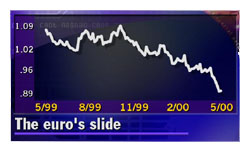|
Euro under fire; an analysis
|
 |
May 8, 2000: 11:37 a.m. ET
Experts say the beleaguered currency will likely weaken further
By Gordon Platt
|
NEW YORK (CNNfn) - The euro began sliding again this morning after a meeting of European finance ministers in Brussels failed to produce a consensus in favor of market intervention to support the currency.
Analysts and traders said the euro will likely continue to set a series of new lows in the weeks ahead. It reached a record low of 88.45 cents last Thursday.
Finance Ministers from the 11 euro-zone countries pledged to push ahead with economic reforms, but declined to comment about the possibility of intervention.
While economic fundamentals may not justify a further decline in the euro, which has dropped 24 percent since it was introduced in January 1999, analysts said market psychology has so soured on the new currency that nothing short of coordinated intervention by the Group of Seven major industrial nations will support it.
The European Central Bank does not want to risk intervening alone to defend the euro, analysts said, for fear that a failure to turn the tide in the euro's favor could cause it to lose even more credibility.
A coordinated effort to bolster the euro?
"There is a possibility, given the magnitude of the euro's decline, that there could be coordinated intervention by the Group of Seven," said Marc Chandler, chief currency strategist at Mellon Financial in New York.
"Coordinated intervention, including Japan intervening on the euro against the yen for the first time, would be the best thing that could happen for the euro," Chandler said.
Click here for the latest market news from CNNfn.com.
Click here for the latest currency rates.
Analysts said the ECB cannot afford to remove the implicit threat of intervention or it will encourage speculators to believe the euro is on a one-way street downhill.
"The vast majority of recent comments by ECB officials showed a true reluctance to intervene," said Bob Lynch, currency strategist at Paribas in New York.
"The risk of intervention may have increased, but it is still not likely," Lynch said. "More likely, the ECB will do nothing for the time being," he said.
 The ECB holds a biweekly council meeting Thursday, but no action on interest rates or intervention is expected. If the ECB eventually does decide to enter the currency market to rescue the euro, it will have plenty of ammunition. The ECB and the 11 national central banks of the euro zone have the highest gold and currency reserves in the world. The ECB holds a biweekly council meeting Thursday, but no action on interest rates or intervention is expected. If the ECB eventually does decide to enter the currency market to rescue the euro, it will have plenty of ammunition. The ECB and the 11 national central banks of the euro zone have the highest gold and currency reserves in the world.
Since the start of European economic and monetary union, and the end of obligations by member countries to intervene in support of one another's currencies, the euro system has had surplus foreign reserves, according to researchers at Deutsche Bank.
Estimates of the amount of reserves that are no longer needed for monetary policy range from $100 billion to around $240 billion, they said.
A good opportunity to sell reserves
The current weakness of the euro is a good opportunity for European central banks to sell dollar reserves at a profit, analysts said. This would support the euro and remove any suspicion that the ECB is pursuing a policy of "benign neglect" toward the euro exchange rate.
Generally, reserves are mainly held in order to be able to intervene on the foreign exchange markets, the Deutsche Bank researchers said. Reserves also improve confidence, however, and the sale of currency reserves could be interpreted as a sign of weakness of the euro and it could trade even lower, they added.
Analysts said the liquidity effects of large-scale currency sales do not represent a problem. The ECB can always increase the volume of its open-market transactions to compensate for the losses in liquidity.
The United States would likely favor sterilized intervention, as this would not create a conflict between dollar selling and tightening by the Federal Reserve, said analysts at IDEAglobal.com.
The United States would also favor intervention over a series of European rate hikes, the analysts said. "The only problem is whether the United States would be willing to intervene in an election year and also face question marks over its strong dollar policy," they said.
Euro's woes spread to the pound
Meanwhile, the euro's weakness is beginning to infect the British pound, which fell to a four-year low of $1.5280 last Thursday from nearly $1.66 last November. Britain's Monetary Policy Committee declined to raise interest rates Thursday, in what analysts said was a close call. This, together with the weakening euro, weighed on the pound.
Analysts said failure of the European finance ministers to mention intervention in their statement this morning was a big negative for the euro. They realized, however, that the ECB is unlikely to tip its hand and announce intervention in advance.
"Ultimately, it is not the size of intervention that matters, but the timing of the move to finesse the market, " said Chandler of Mellon Financial.
--Gordon Platt is a freelance columnist writing about currency markets for CNNfn.com.
* Disclaimer 
|
|
|
|
|
 |

|

